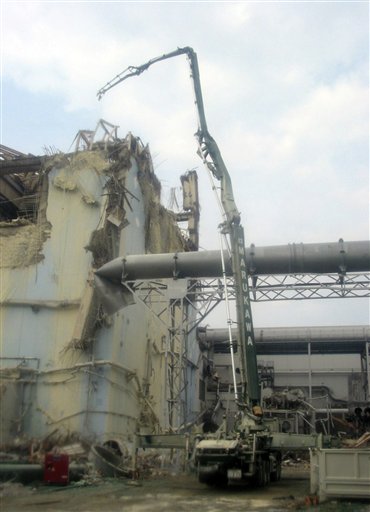You are here
submitted by Luis Kun
by Mari Yamaguchi, Associated Press - June 15, 2011

In this Monday, June 13, 2011 photo released by Tokyo Electric Power Co., a machine collects radioactive substances in the air for sampling at the Unit 3 of the crippled Fukushima Dai-ichi nuclear power plant in Okuma, Fukushima prefecture, northeastern Japan. (AP Photo/Tokyo Electric Power Co.) EDITORIAL USE ONLY
TOKYO (AP) — Japanese whalers caught two animals along the northern coast that had traces of radiation, presumably from leaks at a damaged nuclear power plant, officials said Wednesday.
Two of 17 minke whales caught off the Pacific coast of Hokkaido showed traces of radioactive cesium, both about one-twentieth of the legal limit, fisheries officials said.
They are the first whales thought to have been affected by radiation leaked from the Fukushima Dai-ichi nuclear plant since it was hit by a March 11 earthquake and tsunami.
"The levels are far below the limit, and the meat from the catch is safe for consumption," Fisheries Agency official Kosei Takekoshi said.
One of the minkes had a cesium reading of 31 becquerels per kilogram, and the other 24.3 becquerels, compared to the legal limit of 500 becquerels per kilogram for highly migratory marine products.
The 17 whales were caught off the shores of Kushiro city — a main coastal whaling hub — during an April 25-June 10 expedition.
The agency has not previously surveyed radiation in whales, so no comparison is available before and after the Fukushima crisis.
The government has banned fishing around the coastal nuclear plant. Local government and fisheries officials have been monitoring radiation in seafood along the coast weekly.
The March 11 disaster knocked out power and crucial cooling systems at the Fukushima plant, melting fuel in three reactors and leaking massive radiation into the environment.
Some radioactive water was released from the plant into the ocean, causing concerns about contamination of seafood.
The leakage stopped after the plant operator sealed cracks, built oil fences around the plant and took other steps.
On Wednesday, plant workers tested a treatment system for highly-radioactive water now kept in temporary storage that may overflow within days. The idea is to decontaminate the water and eventually reuse it as core coolant. Following a final test, the system is set to enter full operation Friday.
Japan hunts whales under an exception to an international commercial whaling ban that allows for scientific research. But opponents say Japan's research program is a cover for commercial whaling because the whale meat not used for research is sold for consumption in Japan.
In Washington, the U.S. Nuclear Regulatory Commission said Wednesday its early fears were unfounded that the plant's spent fuel pool went dry at the peak of the crisis in March.
The NRC says new video shows Unit 4 pool probably did not go dry. NRC Chairman Gregory Jaczko had insisted they were dry based on an NRC assessment of the site in March, and Japanese officials had denied it at the time.
Associated Press writer Matthew Daly contributed to this report from Washington.
http://www.cnsnews.com/news/article/traces-radiation-found-2-whales-japan



Recent Comments